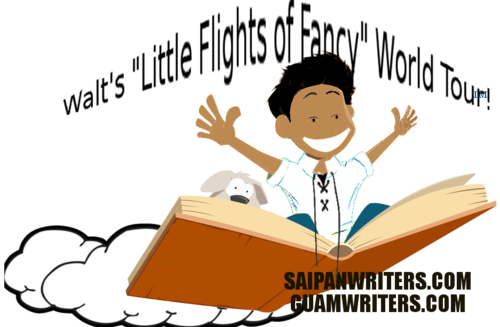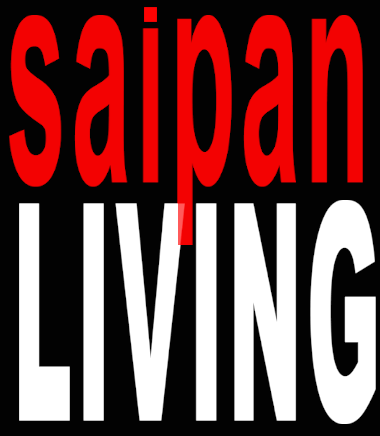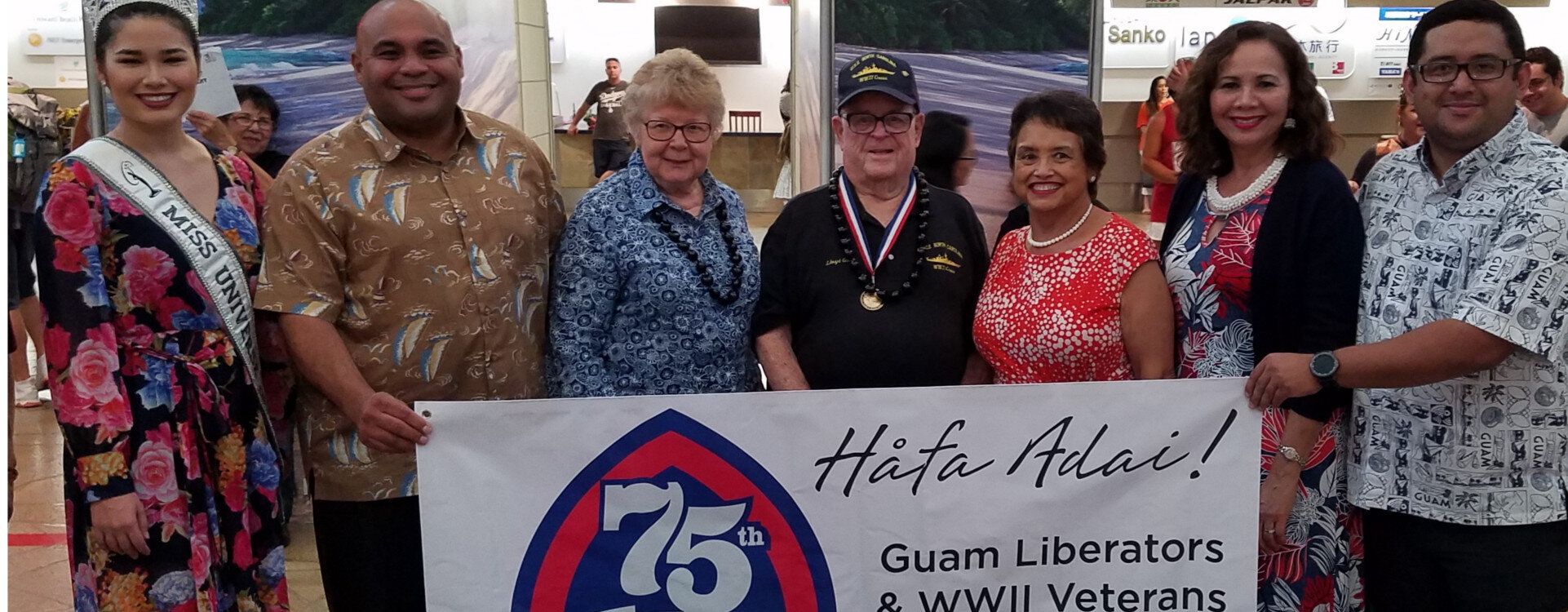
The Reluctant Hero: an open letter to Lloyd Glick
(from your co-author)
[Excerpt from CHAPTER 7 of From Bugle Boy to Battleship
"Sometimes, your identity is as much how you
perceive yourself as it is how others perceive you."
--Walt Goodridge
On February 3rd and 4th, 2014, I had the opportunity to conduct land tours of the islands of Guam and Saipan for Lloyd Glick, a returning WWII veteran, and his wife, Judy. Seventy-one years ago, Lloyd was stationed aboard the battleship, USS North Carolina, during the pivotal Battle of Saipan and Battle of Guam. The ship was part of the fleet that bombed the islands in preparation for the ground invasion by US troops. Lloyd’s official rank was “Musician Second Class,” and he was a trumpeter in a twenty-piece swing band onboard the ship. Bands were part of the repair department aboard the ship, and so his other duties included maintenance, fire-fighting as well as specific battle station duties when the ship was actually in battle.
If you ask him, Lloyd Glick will steadfastly and adamantly refuse to bear the mantle and title of "hero" in reference to his participation in the Pacific campaigns of World War II. He'll tell you flat out he feels unworthy, given that many of his fellow patriots lost their lives on the battleships and battlefields of that time. He'll tell you he feels guilty that he survived and that they didn't. I heard him voice this thought several times during our numerous email chats prior to his arrival, as well as throughout the two days we were actually touring the islands.
The following, therefore, are a few of my thoughts on the matter.
People choose their heroes.
Lloyd, being a hero is not always about rescuing cats from trees, or taking a hill and capturing the enemy all by yourself. People choose their heroes and, quite frankly, you often have no choice or say in the matter.
You are a hero because right after Pearl Harbor, when others ran away, stayed silent or remained at home, you, at age 19, ran towards the fray. That puts you in a narrow field with the tens of thousands who enlisted in the months immediately following.
You are a hero to those on Guam, because, regardless of your individual role and contribution while on the ship, you were part of the overall force to whom the island owes its gratitude for liberation. In my opinion, heroism is not defined solely by the lives you end, but also by the lives you enrich, and it may actually take more courage to enter battle equipped with only a bugle, than with a bayonet.
You are a hero to those in the United States because you are part of group of men and women who’ve been assigned the seemingly hyperbolic, yet arguably deserved name of "the greatest generation," characterized by a rare selflessness and penchant for personal sacrifice in the face of national interests—traits many consider lacking in today’s society.
You are a hero to people in every nation around the world simply because you are here with us to tell your story and to keep the memory and reality of that era alive. That puts you in a field of a small, elite group of World War II veterans.
As you can see, as long as you choose to be here among us, none of these are under your control to opt out of, or go back in time to change. You’re stuck with them. Yes, people choose whom they call “hero.”
The real tragedy
It's a profound, yet often overlooked aspect of war that the people who actually fight and die in battle are not the individuals who actually start the wars. Wars don’t simply “break out.” Average citizens living their daily lives don’t simply wake up one morning and decide, en masse, to wage war.
No, war is a specifically chosen, orchestrated and executed option for responding to a situation or fulfilling an agenda; and specific individuals who make these decisions.
Nations enter into war because of the interests, agendas and decisions of individual members of an elite ruling class acting more often than not on corporate and political interests that oftentimes have little concern or respect for the will or ultimate benefit of the people. It’s a tragedy, therefore, the loyalties and national pride of the masses are swayed and exploited, and that it is the innocent citizenry who risk and lay down their lives in the furtherance of these agendas.
"Wars are never declared by the individuals
who end up fighting and dying in them.”
Yes, Lloyd, I agree that war is tragedy. People lose their lives who would otherwise be alive. People abandon dreams they would otherwise pursue. People lose loved ones who would otherwise have remained safe at home. Nations fight against nations, man against man, and an individual across the oceans, whom I’ve never met, suddenly becomes my “enemy,” and we are forced to kill each other to further the agendas of far away individuals and corporations. Yes, the losses of war are tragic all the way around. We as a society must bear the burden for the real tragedy: that we allow others to send us to our deaths killing people we don’t know and have never met. The burden of the deaths of your fellow service members, Lloyd, and the unfulfilled dreams they represent are not yours to carry alone. It is a function of the way things have developed that we as a society must strive to eliminate.
Noble intentions & the heinous and heroic
Yes, throughout history and up to very recent times, we learn that leaders have often endorsed, declared, entered into, and committed their citizens to the violence of war under false pretexts. The emotions of the masses are exploited for political and financial gain. It's a shame that innocent individuals—and by that I mean all the rest of us—are caught up in the frenzy of fear and façade of fighting foes.
People enter into and engage in
the most ignoble of activities
often under the most noble of intentions
The irony, however, is that those who choose to fight, however, often choose to do so with the noblest of intentions that include allegiance and commitment to family, future and freedom. They travel to foreign lands to commit the most violent acts in the name of peace and the preservation of free civilization.
It is this fact that presents us with one of the most volatile and irreconcilable of contradictions in our society: where, on one hand, individuals are praised as “hero” for actions that, on the other hand, are condemned as heinous.
However, neither the manipulation that sparks it nor the contradiction that ensues should minimize or trivialize the purity of the intentions behind them. You are a hero, Lloyd, because your intentions are pure.
The Liberator’s Lot
Fortunately, in some cases, the line between “right” and “wrong” are more clearly drawn. Yes, in some cases, there are indeed measurable, quantifiable and positive outcomes for the people and the lands affected by the violence of war.
"There are no hierarchies based on rank or role in the job description of 'liberator.'"--Walt
On the island of Guam, Lloyd, you heard the term "liberator" used freely and often in everyday parlance with respect to veterans like yourself. Present-day Guamanians recognize that the story of Guam would be radically different today had it not been for the invasion and the wresting of it from Japanese control. And, Lloyd, whether you shelled or shucked, cooked or cleaned, battled or bugled as part of the force that participated in that liberation, you will be cast—however much you resist—alongside everyone else without regard for the specific task list assigned your individual job title. In other words, when it comes down to it, there is no hierarchy based on rank or role in the job description of 'liberator.'" Respect is due to all.
And with all due respect as well to the loss of life on both sides of the imaginary line between “friend” and “foe,” you, Lloyd Glick, remain and exist as a symbol of a pivotal moment in history that marked a transition in governance, and which holds significance in the day-to-day lives of people on Guam who are grateful.
So, you're stuck with it, Lloyd. It may seem undeserved to you. It may make you feel uncomfortable and stir within you the need to protest, but this is your lot in life. The mantle of “liberator” (read: “hero”) is forever yours on Guam.
The Forever Sacrifice
“Some give their lives once,
and a bullet seals the deal.
Some give their lives forever,
to help survivors heal.” --Walt
and a bullet seals the deal.
Some give their lives forever,
to help survivors heal.” --Walt
In the process of helping you share your story, Lloyd, I've learned a few things about you. I’ve learned that you've essentially dedicated your life to public service. You started by using your and talent for music (your "given gift") and turning that passion towards the war effort so that others could be serenaded and soothed even amid the horror that is war. After the war, you served on several police forces so that others may be safe.
Throughout our time together on Guam and Saipan, we heard others make constant positive references to your state of good health. I suspect that this too represents a service to your fellow service members. I suspect that through sheer strength of will (and the nurturing home life provided by a caring wife and partner), you've kept yourself fit and sharp in order to travel and to continue tell the tale as your own personal tribute to the lives and legacies of those with whom you served. I suspect that this pilgrimage to Saipan and Guam, as well as the autobiography you've allowed me the honor of preparing on your behalf are, quite frankly, additional ways for you to honor and salute your fellow soldiers, sailors and airmen. That’s just a theory of mine, but that’s my story and I’m sticking to it!
It’s evident you've chosen to dedicate your life to service. The life of service to which you've committed yourself all these years is a great "forever sacrifice" chosen as a way to honor your war mates. One group makes an ultimate sacrifice and hand over their lives on the battlefield. Another group makes a forever sacrifice and hand over their lives by way of ongoing service in the memory of the first group. Both groups are heroes.
And finally, I see you as a hero, because with all the evidence of bravery, noble intentions, personal sacrifice and lifelong service staring you in the face, you still don't see Lloyd Glick the way others see him. By my estimation, that puts you in league with the humble. And, my good friend, Lloyd, from where I stand, it doesn't get any more heroic than that!
Sincerely,
Walt F.J. Goodridge
Walt F.J. Goodridge
From Bugle Boy to Battleship
a Battle of Saipan and Battle of Guam Veteran's Memoir
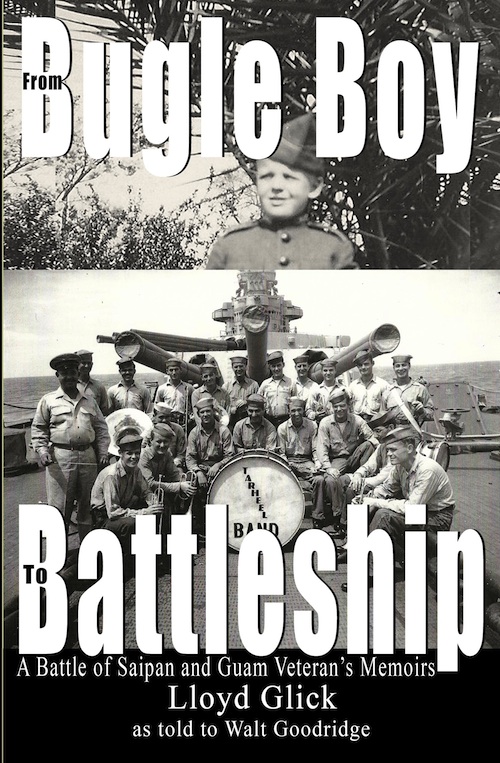
Born in California on December 28th, 1923, Lloyd Glick was a naive 18-year-old boy watching a movie at a theater in downtown Berkeley on Dec 7 1941, when they stopped the movie to announce Japan's bombing of Pearl Harbor.
Four months later, with his parents' signed permission, he joined the United States Navy. That decision would ultimately land him the position of Musician Second Class aboard the USS North Carolina as a member of the ship's band while it participated in the bombings of Saipan, Guam, Palau, Pohnpei, and battles throughout World War II's pivotal Pacific Campaign.
Bugle Boy to Battleship is Lloyd's fascinating account of his two years at sea, as well as his return to visit the island of Saipan 70 years later.
Bugle Boy to Battleship includes the actual emails that also tell the story of the unique relationship between Lloyd and his "tour guide" --an author living on Saipan--who became inspired by their correspondence to help Lloyd document his story for this and future generationsRead more at www.bestofsaipan.com
Order Now!
Order in your favorite format:
Check out Walt's Saipan-Specific brands
Download Walt's CV/Media KitBreaking News from Walt:
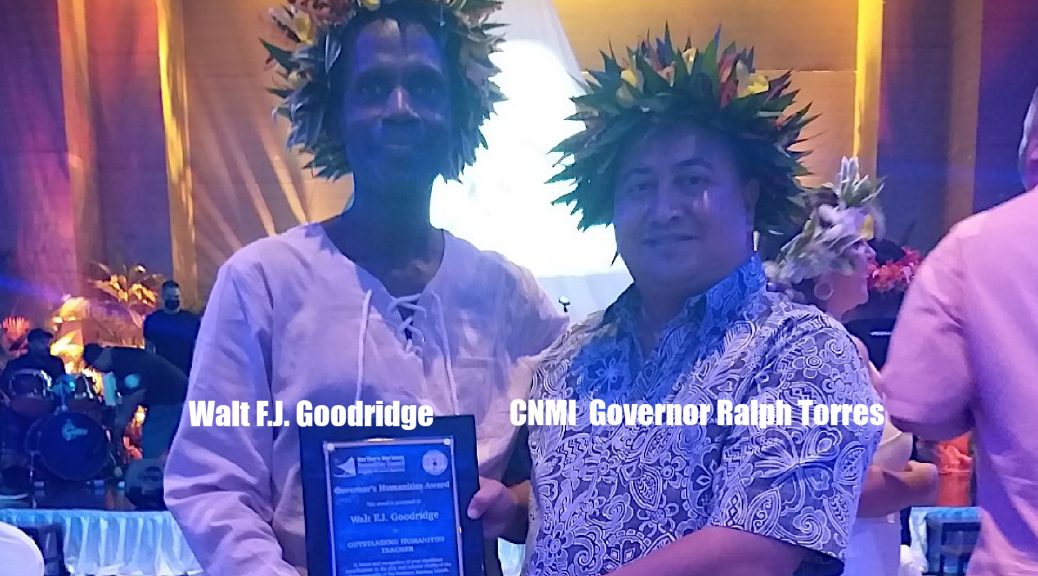
LOCAL AUTHOR RECEIVES CNMI GOVERNOR'S HUMANITIES AWARD(S)
A few weeks ago, a former workshop attendee and coaching client revealed that she nominated me to be considered for this year’s Governor’s Humanities Award here on Saipan. I thanked her, but I didn’t really believe I qualified because...(read why at www.jamaicaninchina.com/humanities-award)
A few weeks ago, a former workshop attendee and coaching client revealed that she nominated me to be considered for this year’s Governor’s Humanities Award here on Saipan. I thanked her, but I didn’t really believe I qualified because...(read why at www.jamaicaninchina.com/humanities-award)

Check out the FREE Preview of the Saipan Tour App!
Can't make it to Saipan during the pandemic? No worries! Check out this FREE preview of the Discover Saipan Tour App and experience the island's SECOND best tour experience! This special online version of the self-guided, GPS-assisted app, is available for a limited times! https://www.cnmitourism.com/saipantourapp/preview
Please allow a few moments for all the graphics to load! The mobile app (only $1) is available on the Google Play Store (See "About the App" for the link)


